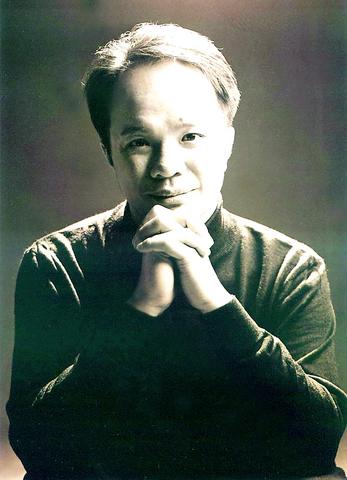Not many 10-year-olds tickle the ivories as symphony soloists, so after Tainan-born Rueibin Chen (陳瑞斌) did so in 1978 with the Taipei Symphony Orchestra, big things were expected of him.
At 13, Chen moved to Vienna, obtaining a concert diploma and a subsequent soloist's examination award in Hanover, Germany, before going on to take master classes under Murray Perahia. He has since collected a mantle of highly prized awards, including Vienna's Boesendorfer Prize in 1983, Paris' Albert Roussel Prize in 1991 and Taiwan's own "best arts performance" prize in 2000.
That was the last time Chen played in Taiwan and he's making a welcome return in a series of three concerts starting in Taipei tomorrow, Nov. 9, then moving to Taichung on Friday, Nov. 11 and returning home to Tainan on Friday, Nov. 15.

PHOTO COURTESY OF MUSICPOWER
"The pressure playing in Tainan is intense compared with Taipei," Chen said in a telephone interview at the end of a full day of rehearsing. "The audiences there are more conservative, more accustomed to traditional Taiwanese entertainment than they are to classical music.
"Besides, my parents are there," he added laughing. "That makes it really intense."
To hear Chen admit stage freight seems unusual for a musician of his caliber. Since his European debut in 1984 at the Vienna Koncerthaus, he has performed non-stop at one festival after another: the International Salzburg Music Festival, the Vienna Spring Festival, the Schleswig-Holstein Music Festival, the Hong Kong Festival, the International Rachmaninoff Music Festival in Moscow and the Taipei Music Festival, where he performed for the first time Rachmaninoff's complete concertos.
In 1989 he was selected "best young artist" by Taiwan's Ministry of Culture. Three years later, he was asked by then president Lee Teng-hui (李登輝) to play at the Presidential Palace in a festival concert that was broadcast across the nation. He's won international piano competitions in Warsaw, Tel Aviv, Athens, Vienna, Rome and even played for former Israeli president Itzhak Rabin.
"2000 was the last time I played as a soloist in Taiwan," Chen said.
"Before then, I had the honor of accompanying the Taipei Symphony Orchestra as piano soloist on their 1998 tour of Asia."
Chamber music is another area in which Chen excels. He has performed with well-known groups like the Shanghai Quartet and Lark Quartet. So can Taiwan audiences expect a song or two at any of his concerts? "No, no, no," he says. "No singing. Strictly piano."
Rueibin Chen plays the Taipei National Concert Hall (台北國家音樂廳) tomorrow night at 7:45pm. Performances at Taichung's Chungshan Hall (台中中山堂) and the Tainan City Arts Center (台南市立藝樹中心) both begin at 7:30pm. Tickets are available online at http://www.ticket.com.tw or by calling the venues; Taipei (02) 2341-9898, Taichung (04) 2292-5321, Tainan (06) 214-9441.

Taiwan has next to no political engagement in Myanmar, either with the ruling military junta nor the dozens of armed groups who’ve in the last five years taken over around two-thirds of the nation’s territory in a sprawling, patchwork civil war. But early last month, the leader of one relatively minor Burmese revolutionary faction, General Nerdah Bomya, who is also an alleged war criminal, made a low key visit to Taipei, where he met with a member of President William Lai’s (賴清德) staff, a retired Taiwanese military official and several academics. “I feel like Taiwan is a good example of

March 2 to March 8 Gunfire rang out along the shore of the frontline island of Lieyu (烈嶼) on a foggy afternoon on March 7, 1987. By the time it was over, about 20 unarmed Vietnamese refugees — men, women, elderly and children — were dead. They were hastily buried, followed by decades of silence. Months later, opposition politicians and journalists tried to uncover what had happened, but conflicting accounts only deepened the confusion. One version suggested that government troops had mistakenly killed their own operatives attempting to return home from Vietnam. The military maintained that the

Jacques Poissant’s suffering stopped the day he asked his daughter if it would be “cowardly to ask to be helped to die.” The retired Canadian insurance adviser was 93, and “was wasting away” after a long battle with prostate cancer. “He no longer had any zest for life,” Josee Poissant said. Last year her mother made the same choice at 96 when she realized she would not be getting out of hospital. She died surrounded by her children and their partners listening to the music she loved. “She was at peace. She sang until she went to sleep.” Josee Poissant remembers it as a beautiful

Before the last section of the round-the-island railway was electrified, one old blue train still chugged back and forth between Pingtung County’s Fangliao (枋寮) and Taitung (台東) stations once a day. It was so slow, was so hot (it had no air conditioning) and covered such a short distance, that the low fare still failed to attract many riders. This relic of the past was finally retired when the South Link Line was fully electrified on Dec. 23, 2020. A wave of nostalgia surrounded the termination of the Ordinary Train service, as these train carriages had been in use for decades